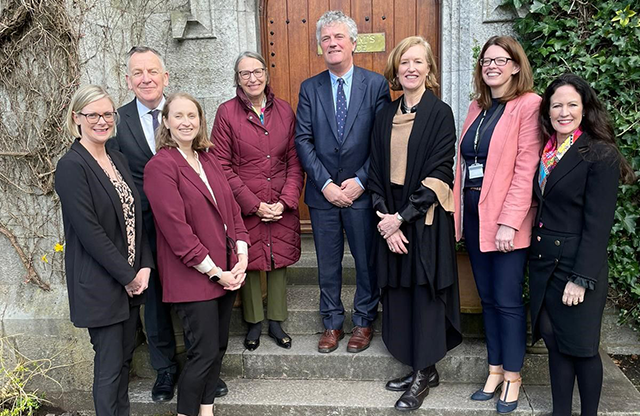IPR Faculty Launches Partnership to Support Irish Families with Disabilities
Terese Sommer’s new collaboration takes a two-generation approach to wellbeing
Get all our news
Children are often a major motivator for their parents to improve their own lot in lives, whether that be through education, career, or overall wellbeing.”
Terese Sommer
IPR research professor

Terese Sommer (third from the right) with project partners at the Crann Centre in March 2024, where she gave a talk and interviewed clients and staff to learn more about their work and impact.
Ireland faces significant challenges in supporting families with disabilities. More than 700,000 people in Ireland live with neurological conditions, and the country has the second-highest rate of spina bifida in the European Union. Individuals with disabilities in Ireland have some of the lowest employment rates in the EU.
A new collaboration among Northwestern University and institutions in County Cork, Ireland, aims to understand and address the needs of Irish families living with neuro-physical disabilities.
In spring 2024, Northwestern’s Roberta Buffett Institute for Global Affairs awarded IPR research professor Terese Sommer a Global Collaboration Grant to work with Padraig Mallon at the Crann Centre and Siobhán Cusack at University College Cork (UCC). The partnership will engage families with disabilities to produce translatable research.
Sommer, along with IPR research professor Lauren Tighe, leads Northwestern’s Two-Generation Research Initiative (NU2Gen), which has been at the forefront of aligning educational services for children with workforce training and education for their parents for the last 15 years.
This emerging collaboration comes on the heels of an article by Sommer and colleagues in Child Development Perspectives calling for coordinated, simultaneous services for children and their caregivers to maximize children’s developmental potential and alleviate poverty.
“Children are often a major motivator for their parents to improve their own lot in lives, whether that be through education, career, or overall wellbeing,” Sommer said, explained in an interview on the Crann Centre’s podcast. “And then we know that that, in turn, influences outcomes for children.”
Sommer’s new collaboration in Ireland is a prime example of this global two-generation work.
The NU2Gen and Crann Centre collaboration was initiated through the Ascend at the Aspen Institute, an initiative promoting intergenerational family prosperity. As NU2Gen and Crann Centre began initial conversations, the Crann Centre and UCC were formalizing a partnership to enable collaborative research and teaching.
Over the next year, the new collaboration between NU2Gen, Crann Centre, and UCC will establish a Research Advisory Working Group, co-design a research agenda, and seek cross-national funding sources. They will evaluate the Crann Centre’s whole family care model, aiming to influence policies and programs on a broader scale.
The Crann Centre, an Irish NGO co-founded by American philanthropist Kate Jarvey, supports over 500 families with neuro-physical disabilities. Its comprehensive care model addresses independent living, mobility, social capital, psychological wellbeing, health, education, and career pathways.
“What is particularly distinctive about this partnership with the Crann Center is that they were true 2Gen from the beginning,” Sommer explained. “Most of the time an organization provides services primarily from a platform to children or to adults. From day one, Crann was invested in helping families whether the primary client was the child that had the neuro-physical disability or the adult.”
The project, which kicked off in June, will progress through five phases over the course of a year. These include the formation of a research advisory group, a mini-strategy conference, and the release of a comprehensive research agenda. Leveraging the UCC team’s extensive experience in community-engaged research in Cork, the initiative will center the input of families living with disabilities in their study of the Crann Centre’s model—something Sommer has learned is essential.
“When I originally went into research, I wanted to make sure that I didn't just focus on the numbers, but be close to the phenomenon of what’s actually happening,” Sommer shared. “And it’s just been incredibly rewarding to see changes in families over time—to be able to document them, and then to actually use that to influence policy.”
Teresa Eckrich Sommer is the Director and Co-Founder of the Two Generation Research Initiative (NU2Gen) and an IPR research professor.
Published: November 19, 2024.


